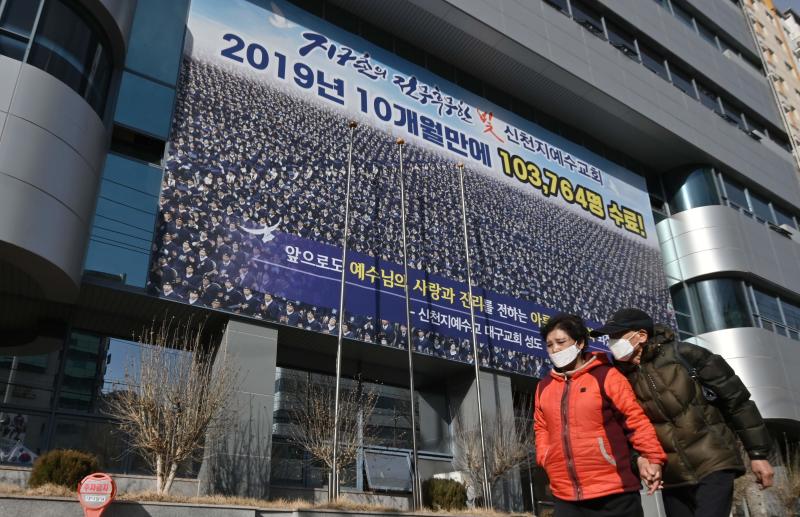South Korean cult's activities in Singapore mirror its shadowy operations elsewhere
Sign up now: Get ST's newsletters delivered to your inbox

Pedestrians wearing face masks walk in front of the Daegu branch of the Shincheonji Church of Jesus in South Korea, on Feb 24, 2020.
PHOTO: AFP
SINGAPORE - It is a religious group that operated in secret, luring Christian youths and young adults via a front, and then compelling them to keep the group's existence a secret.
Recruited members were not allowed to contact each other, verify teachings with other churches, or speak to their families about the group's activities.
This was how members of the Shincheonji Church of Jesus operated in secrecy here, including setting up companies under the guise of providing consultancy services or workshops.
The Ministry of Home Affairs (MHA) said this in a statement on Friday (Feb 28), revealing the workings of the ultra-secret religious cult in Singapore.
Their modus operandi here mirrors tactics they have used elsewhere in the world.
The group, whose name in full is the "Shincheonji Church of Jesus, the Temple of the Tabernacle of the Testimony", originated in South Korea.
It is also at the centre of the country's coronavirus outbreak in the city of Daegu. Over half of South Korea's more than 2,300 coronavirus cases are linked to the church.
Shincheonji, in the Korean language, means "new heaven and earth". Founded in 1984 by religious leader Lee Man-hee, the church is widely seen as a heretical Christian group, which claims to have over 200,000 adherents around the world. It is not officially recognised in Singapore.
So far, five South Koreans and two Singaporeans are assisting in ongoing investigations, said the MHA. The group has less than 100 members here, Home Affairs Minister K. Shanmugam said on Friday.
Among the group's radical beliefs is one which says that its founder Lee is the second coming of Jesus Christ, and that he will bring 144,000 followers to Heaven with him on judgement day.
The church's website also describes Lee as an angel of Jesus.
"Shincheonji followers believe Lee Man-hee is immortal and has an eternal life," Professor Tark Ji-il, an expert in heretical Christian groups at Busan Presbyterian University in South Korea, told the AP news agency.
"To propagate their belief, they often approach their relatives and acquaintances or sneak to other churches without telling them they are Shincheonji members."
In South Korea, Shincheonji is organised into "12 tribes", each named after one of Jesus' disciples.
On its website, the church says its has 300 mission centres in 15 countries, including the United States, China, Australia, Japan and the Philippines. It opened a branch in Wuhan last year.
The website goes on to say that hundreds of pastors have renounced their ordainment to join Shincheonji.
But Shincheonji has also come under intense criticism in the wake of the coronavirus outbreak in South Korea.
Over a million South Koreans have signed an online petition calling for the forcible dissolution of the shadowy group, after reports emerged that Shincheonji members were uncooperative and hampered health authorities' efforts to trace and contain the outbreak.
The group's critics say it teaches a distorted theology centred around the end of the world, brainwashes its followers, and breaks families apart. There are many reports on how members cut ties with their families after joining the church.
Critics also say that Shincheonji claims its teachings are a "superior truth" to that offered by mainstream churches.
Reports on how the group operates often say members infiltrate mainstream churches and use deceptive methods to lure young converts, in some cases inviting them to bible study sessions.
In 2016, the Church of England issued an alert to about 500 parishes in London about a Shincheonji-linked charity that was recruiting churchgoers.


